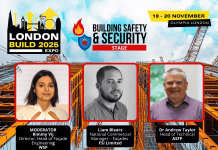Ryan Simmonds, Sales Director for Framing at voestalpine Metsec plc, explores the importance of only specifying framing materials that have been fire tested or assessed and the options available to the industry
Fire safety is high on the agenda for all of us in the construction industry – and rightly so. It was reported last month that the number of tenders for fire safety work issued by the public sector has soared 56% in the 12 months since the Grenfell Tower fire.
There were 687,476 incidents attended by fire and rescue services in Great Britain in 2016-17, with the recent Hackitt Report on the Grenfell Tower tragedy concluding that indifference and ignorance led to a “race to the bottom” in building safety practices, with cost prioritised over safety.
The number of councils tendering for fire safety work has shot up in the year since the Grenfell disaster, according to the latest figures – local government buyers publishing twice as many fire safety tenders in the last 12 months compared to the previous year.
With concerns about public safety rising, the government has called for independent reports to analyse building regulations and fire safety in greater detail. We may well see regulations tightened and enforcement of building standards move to a higher level.
The building industry as a whole will need to deliver solutions to the required performance specification, while we can expect a higher level of scrutiny of the installation and performance of products and systems, whether or not it is a high-rise project.
Many of us in the construction industry have already turned the microscope on ourselves, examining in detail fire safety provision across product ranges and projects.
One issue already emerging from the Grenfell Tower tragedy is that focusing on the performance of one standalone product in a fire is too simplistic and does not address all the risks involved. What is needed is consideration of the myriad of other factors that can allow a fire to spread.
For any future building project, full system testing and fire safety are paramount to any organisation within the construction supply chain.
End clients are calling for additional reassurance and we in the construction industry are being urged to ensure that all components used have been designed and developed in line with the latest fire and safety guidance.
Striking this balance can be a challenge for the industry – but achieving this won’t happen overnight. Having led the market for more than 20 years, we recognised the need to increase the efficiency of steel framing system (SFS) products, which led to the development and launch of the innovative new SFS range.
This includes lighter, more cost-efficient and sustainable design options, as well as robust fire solutions, enabling more efficient wall construction performance.
Months of research, design and stringent fire testing were invested to develop our new SFS range of sections and, with the introduction of more product options to reduce over-specification, we are putting our stake in the ground with regards to where the industry needs to move to, if it is to evolve.
The aim of the new range is to combine best value and quality for installers and end users, as well as have a substantial impact on the green credentials and sustainability of any project where our new SFS solution is implemented.
Our SFS range now has more system testing data than ever before, in fact over 200 wall and floor solution combinations. With our fire performance data tested or assessed by the UK’s leading test centre – the BRE, we also calculate acoustic and thermal data to give complete peace of mind.
Metsec’s new range provides a greater selection of sections, giving architects the capability to create more efficiently designed projects, using the exact product sizes needed. SFS is available in a variety of options including infill, continuous and high-bay walling and an SFS load-bearing system. The new range is BIM Level 2 compliant, with BSI Kitemarks for both BIM projects and BIM objects.
Features include new fire-tested solutions based on British Gypsum, Siniat and Knauf plasterboard; thermal and fire performance solutions using Rockwool insulation; fire performance solutions using RCM Y Wall and Euroform Versaliner sheathing boards. Quality and fire safety do not have to be sacrificed in the name of cost – and should never be.
The construction industry should lead the future fire safety debate, and work with regulators to ensure all parties involved – from contractors to building occupants – view the sector as standard bearers for both quality and safety.
Visit www.metsec.com/sfsframing for more information and to download our brand new technical manual.








![[Video] Enhancing safety with fire doors: A case study of Marina Care Home](https://www.pbctoday.co.uk/news/wp-content/uploads/2025/06/maxresdefault-218x150.jpg)





![[VIDEO] Making DorTrak reports easy to read with Fireco Inspecting fire doors at Fireco, firedoor technology, 2023](https://www.pbctoday.co.uk/news/wp-content/uploads/2024/04/JPZ_2364-web-218x150.jpg)